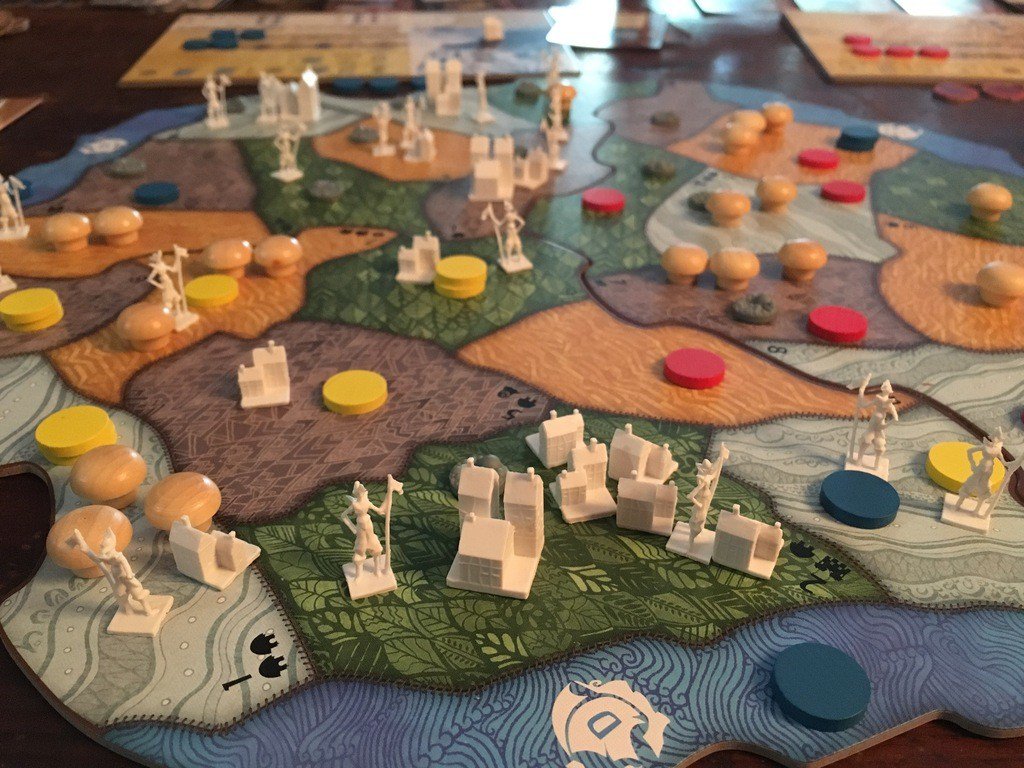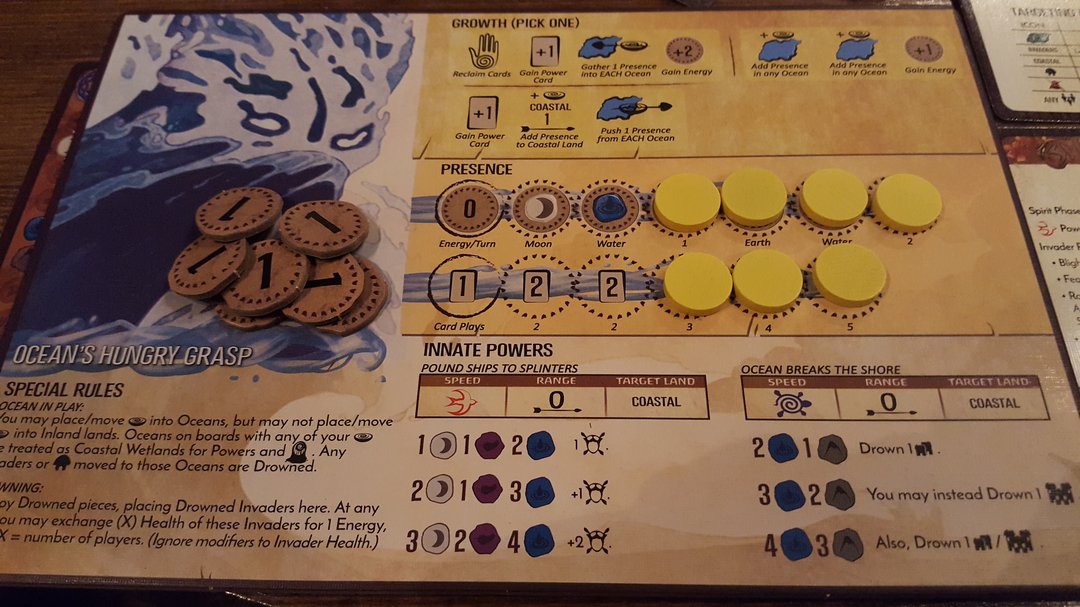This article is a deep dive into some of the mechanics of the board game Spirit Island; if you would like to read our review of the game itself, feel free to check it out here.
With the Superbowl around the corner, it seems like the perfect time to talk about something that’s been on my mind a lot lately: quarterbacking. Admittedly, American football and modern board games only share a tangential relationship here, but the term has become used in both fields: a quarterback is a respected team leader in football, helping direct his team to move as one. In boardgaming, that word takes on a more dire definition, though.
If you’ve never encountered quarterbacking in our hobby, consider yourself lucky. Like its parallel in sports, the term refers to someone who shouts out orders and directs the other players. Unlike its counterpart, however, quarterbacking is used to describe bossy players who almost unequivocally evoke the same response from other players: “Why am I playing this game with you when you’re clearly playing it for the both of us?”
Perhaps there is a bigger question: are all games doomed to the pitfalls of quarterbacking?

The best of both worlds, or perhaps...the worst?
QB 101
Sometimes, quarterbacking happens because of bossy players. That’s an easy problem with a moderately easy solution. A board game is sort of a social contract between players; you all agree to some pre-determined rules and to abide by whatever abstract concept of “winning” your game of choice sets before you. As a collaborative activity, if someone seems to be acting out, it’s a simple enough matter to bring up that hitherto unspoken arrangement and have an honest, polite conversation about allowing people to make their own choices. Granted, the mileage in your gaming group may vary, and if someone is particularly pushy you may be better served by finding another game for the night.
But it’s not always the fault of a player. Some games simply can’t help but be predisposed towards quarterbacking. There are no better examples in our hobby than in co-op games. Players have to work together, often against a system built by the game that acts in a set manner. There may be some randomness in cards or dice, but players who are familiar with navigating these systems are at an inherent advantage. And since no one likes to lose at a co-op, such games can easily devolve into one person directing the other players until they are the only ones making the big calls. Pandemic, popular amongst veteran gamers and newbies alike and a great game to this day, has been singled out on this count more than a few times by various reviewers over the years; while its puzzle plays collaboratively among players of equal skill level, once you have a vet teaching new players, unless that experienced player can sit on his hands and is comfortable with the group losing him the game, it’s very easy for him to let his experience take over.

And yet when people talk about this game here, they're not talking about co-op games' number one problem.
Smart Enough To Have An IQ Of 250
Smart systems remove error by design. My wife works in IT, and it’s something we talk about a lot at home. If a system encourages fault, why not improve upon it or design it in such a way as to remove even the possibility of that fault? Why should our board gaming hobby suffer when design is a topic we discuss to no end in online forums and on social media? Enter Spirit Island.
Spirit Island has gotten no shortage of praise for its solid systems, challenging co-op puzzle, modular difficulty, and scalability from solo to its full four players. But something else that’s caught a lot of attention is its apparent lack of quarterbacking. How is this possible? It comes down to one, simple factor, my friends.
If we consider that, in order for quarterbacking to occur, one player has to have a significant edge on the game’s systems to see the best line of play in any situation, then obscuring what is “best” in any given moment, without clouding the game into frustration, is the key. I know, I make that sound so simple. Believe me that if I could do what Mr. R. Eric Reuss has done with his game, I would be designing board games myself, supplementing my meager day job, and watching in delight as the shelves of thousands of happy gamers filled with my creations. Sadly, I’m not so talented in that department, but I am able to see what makes Spirit Island such a quarterbacking killer.

Each player plays a spirit which has its own rules and tempo; this is one reason why Spirit Island does so well at making players cooperate.
You see, having played nearly a dozen games of Spirit Island myself, I can say now that there is no one “best” line of play at any given moment. Sometimes, you are desperately forced into stopgap measures due to circumstances, but the game always offers you several options and ways to split the workload amongst your friends. Several of these different lines of play have the actual possibility of yielding favorable results; “I can cancel this ravage here if you can defend that coast,” or, “I can reach that territory for Jack if Jill can cover this space on my board for me.” Sometimes it’s as simple as, “I can play card A or card B, and both will work this turn.” Not only that, the ways in which you can draw cards to add new tricks to your arsenal allows you to pad out your own style or compliment your friends. There’s so much going on during a game that you can’t possibly handle it on your own, but you’re not expected to (unless you’re playing solo). And so you’re stuck asking how you can combine your limited actions with those of your friends. Collaboration, the lofty goal of any co-op game. Players are constantly discussing if this is the turn to play that defense card they’ve been saving, or if perhaps their growth action should be to scoop their cards instead, or spread out to aid a team member in need.
Maybe several of those choices will actually do just fine. Do you play that Steam Vent card, then, or let another player take out some explorers in that forest? Well, maybe you should see what your friends are planning on doing first. Coordination is key, especially because each player is taking a completely different role: Wyatt might be playing a spirit of water that helps move colonists into one place, so Eric can blast them as a spirit of lightning.
Even if you started out defending your own player board section of the island, you’ll quickly be asked by your friends if you can help elsewhere. You’re always mingling with your neighbors. You’re always discussing with them the best collective actions you can take. The game encourages and rewards you for playing together, and that is by design.

Never let this happen to your game nights ever again.
The Wrap Up
I cannot recommend Spirit Island highly enough if your group loves co-op games, especially if it has had issues with quarterbacking. It's a fine line to walk that magic between the overly complex and something that provides proper co-op collaboration, but walk that line like a tightrope artist Spirit Island does. Whether you're playing with two players or up to the full compliment of four, this game gives you all the tools you need to accomplish that thing we so praise here at Sprites and Dice: it gives you the means to enjoy time spent playing with family and friends.
While cleverly sidestepping the possibility of a runaway bossy player.
Editor's note: At the time of writing, this game may yet be between print runs again. However, fear not! The game is continually being sent back for new print runs it seems, and if you can't find a reasonably priced copy of the game after you read this, I'd say it's not long until you see it on shelves again. When we put this article out, Greater Than Games should also have a new run of their promos going up via their web store, and you can total access print-and-play files on BGG for them as well.